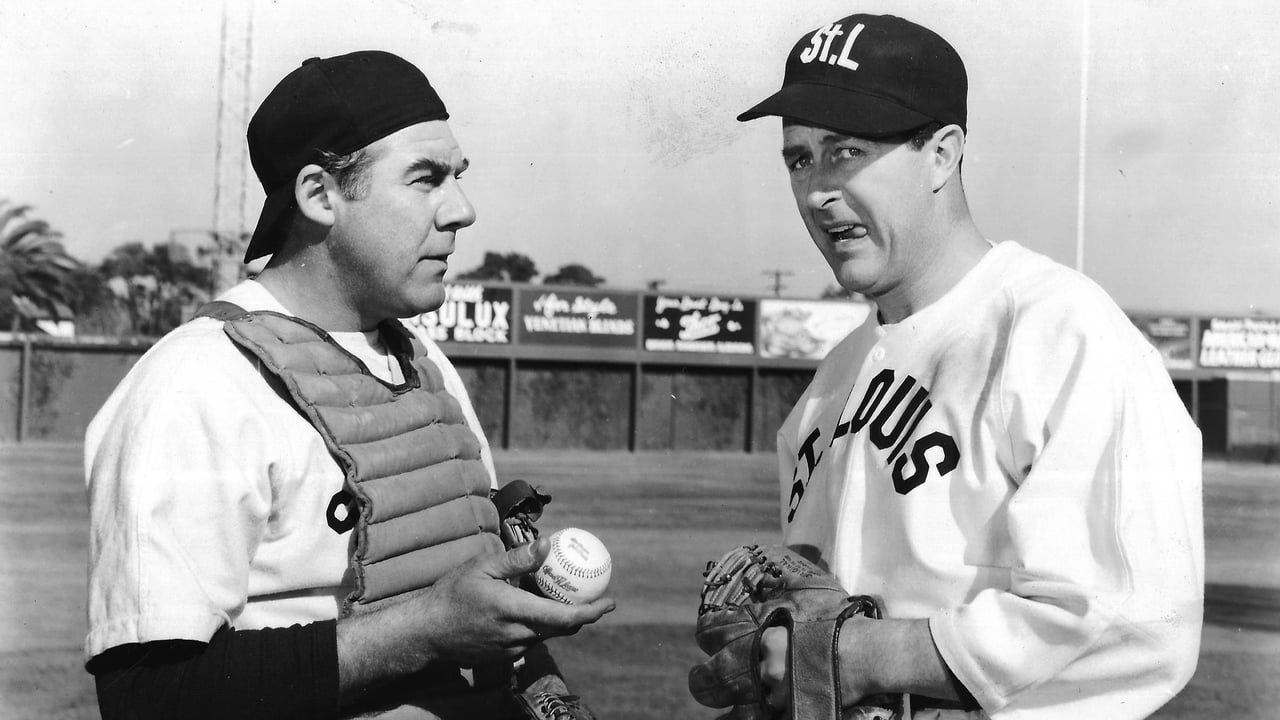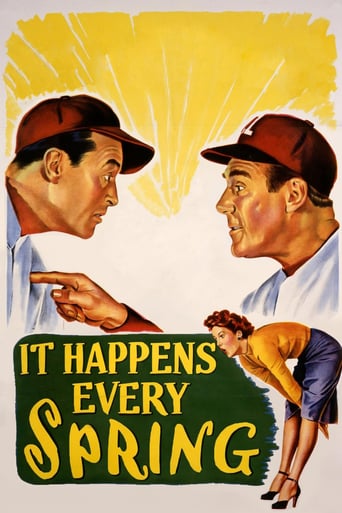

I haven't followed baseball since I was a child. The only sport that's ever interested me is trying to get out of bed in the morning. But this is a movie that convulsed me as a youth and that I still enjoy watching, along with "The Natural" and "Damn Yankees" (except for Tab Hunter, a black hole in any production).Ray Milland is quite good as a slightly aged-in-the-wood chemistry graduate student and professor. He loves his work; he loves his girl, Jean Peters. The only problem is that through the Spring and Summer he's distracted by baseball, which he monitors religiously.One of those lab accidents takes place that produces an unidentifiable mixture of some white fluid -- about a quart -- that is repelled by wood. Scientist that he is, Milland discovers that rolling a baseball around in the stuff makes it impossible for a wooden bat to hit the ball. The ball leaps like a rabbit before returning to its original trajectory. Milland forces his way onto a major league team, leaving everyone to wonder if he's been kidnapped or become a gangster.It's a raw but engaging comedy. Milland pass off the little bottle of fluid as hair tonic and when anyone borrows it and tries to brush his hair, the hair crackles and tries to escape the brush. Paul Douglas is the catcher who first tries Milland out -- "He ain't got a prayer" -- and then is assigned to keep an eye on him because Milland reads books with titles like "The Atom, The Stars, And The Universe", and "Fundamentals of Ballistics," so he's an odd ball, though a valuable odd ball.Don't expect subtlety or sophistication and you'll enjoy yourself.
... View MoreOnce, all things were new. And when It Happens Every Spring was new it probably didn't look as tired as it does now. Sure, there were some great, artistic movies made around 1949, but also some really cheesy stuff. The Adventures of Superman was three years away, and it was a huge hit. Not only is there a resemblance between Ray Miland fiddling with his black frame glasses and Clark Kent, but people back then were quite willing to suspend disbelief for some fun escapist fantasy. You don't hear as much these days about the need to be willing to suspend disbelief, but that's what you are doing for certain types of movies. It's as though there is a plumb level that points straight down for realistic stuff, but is adjusted off plumb to a certain degree by the director at the beginning to establish an alternate reality for a movie or TV show. Now, it's interesting that this movie is set up with a professor talking about chemistry. Way back then in the 1940s scientists were doing some stuff that must have looked pretty astounding to the average layman. Today, we look at the basic premise of a chemical designed to repel insects that instead repelled wood and sneer, but in 1949 the audience might have thought, deep down, "who knows?" Science was almost magical. So the director is setting the plumb, say, 45 degrees off. But it's not way off -- 90 to 180 degrees -- like some dumb modern movies that bear no resemblance to reality. The actors still bear a reasonable resemblance to real people, at least by Hollywood standards -- say 10 to 25 degrees off plumb. But the rest of the situation requires the level stay 45 degrees off, stuff like using a glove with a hole in it and thinking he can get away with a fake name, no pictures and no background identity -- stuff in the cynical modern drug testing post 9/11 world we know no one could every hope to get away with now. But we have agreed to suspend belief with the opening premise to 45 degrees, so the rest goes with the package.A lot of cynical modern viewers post all sorts of critical comments about old movies like this and think they are clever, completely missing the point. Each era seems to have a willingness to suspend disbelief in somewhat different ways. When Goldfinger came out, most people were just blown away with what seemed a great picture. Now, to me, it looks more like Swiss cheese. The closer you look (with the hindsight of home video), the less sense it makes. Yet it's still loads of fun. Today, young viewers are willing to suspend disbelief about all sorts of fantasy movies like Inception and Hunger Games that just leave me cold because I can't. In 1949, people paid their money for a bag of popcorn and some escapist fun, and It Happens Every Spring hit the spot. In the 1950s, it was Damn Yankees, which was probably inspired by this movie, and which faced some of the same plot holes. In the 1960s, it was The Nutty Professor and The Absent Minded Professor (I can't, believe I ever watched that stuff!), plus a fun Twilight Zone episode about a robot pitcher named Casey. And from there it was just dumb and dumber. But there were also The Natural in 1984 (same plot holes), and The Rookie in 2002, which didn't require suspending belief because, according to Hollywood, it was based on a true story.From the 2013 perspective, It Happens Every Spring looks better than some of the more recent stupid stuff, but otherwise rather dull. You have a basic plot that unfolds pretty straightforwardly, with just a bit of suspense about the ending. The early scene of his testing the baseball against a stick of wood was amusingly bad from the perspective of DVD-computer slow motion. Do a freeze frame and you see the ball being jerked up about the same time he begins to swing the stick. The best part, for a movie buff, is seeing some fine old names from movies and TV, like Jessie Royce Landis (North by Northwest) and Lt. Tragg (Ray Collins), plus Alan Hale Jr. (the Skipper) and Ed Begley (not junior). That's one reason to recommend it, the other is if you are a baseball movie buff. Most modern viewers I think would not enjoy this movie, in part because they need more special effects and loud music to pound them into suspending their disbelief. But perhaps this will help: It Happens Every Spring is based on a true story. Really.
... View MoreThis is a great comedy. The fact that a college professor uses a chemistry formula (that makes most things repel wood) to win the World Baseball Championship actually makes it funnier. And it's wholesome fun, despite what some moralists may think. The premise that Ray Milland can't actually pitch too well is what makes this a true screwball comedy - and he is redeemed at the end (I won't say how so I won't spoil the fun of watching it). Absurd situations is what makes funny films. This definitely has the formula for comedy: Witty, lots of jokes, madcap romantic situations, and abundant twists and turns. Milland chose to star in this flick right after his Best Actor Oscar for a reason -it became a top comedy of the era. Paul Douglas is outrageously funny as his bemused catcher (the scene where he rubs Milland's wood-repelling formula into his hair is priceless). And the gorgeous Jean Peters comes across with top honors -she can actually do comedy and it's a shame Fox didn't assign her to more of these. Some other Fox actresses without a knack for comedy, were persistently featured in comedies that could have been much funnier if Miss Peters or Marilyn Monroe had been assigned the female lead. See this film. Like "Some Like it Hot" or "It Should Happen to You" (two films featuring Jack Lemmon), this one's full of fun and you'll laugh every other minute. It should have been selected as one of the 50 top comedies ever, but you know how critics love films with a message (which should never be the case with comedies).
... View MoreYes, it is unrealistic that a pitcher could get away with doctoring up a baseball so that it's impossible to hit, but there are many great comedies that are far-fetched. In fact, I believe MOST good comedies are part fantasy! That's part of what makes them funny! My father looked forward to watching this movie every Spring, when it used to be rerun on one of our four local TV channels available during the 60's. To this day, my brother and I still enjoy occasionally watching this movie, so maybe you will too. By the way, a young Alan Hale Jr. (who goes on to play the Skipper on Gilligan's Island) is one of the college jocks that help the professor test his wood-repellent on the field.
... View More